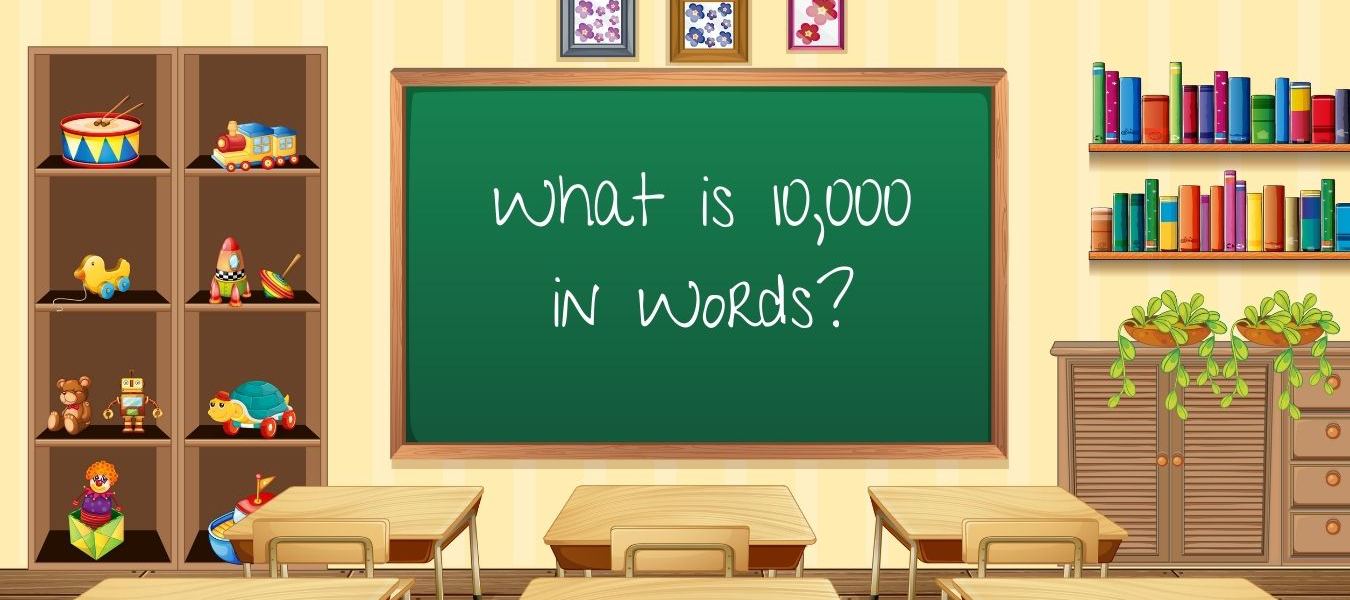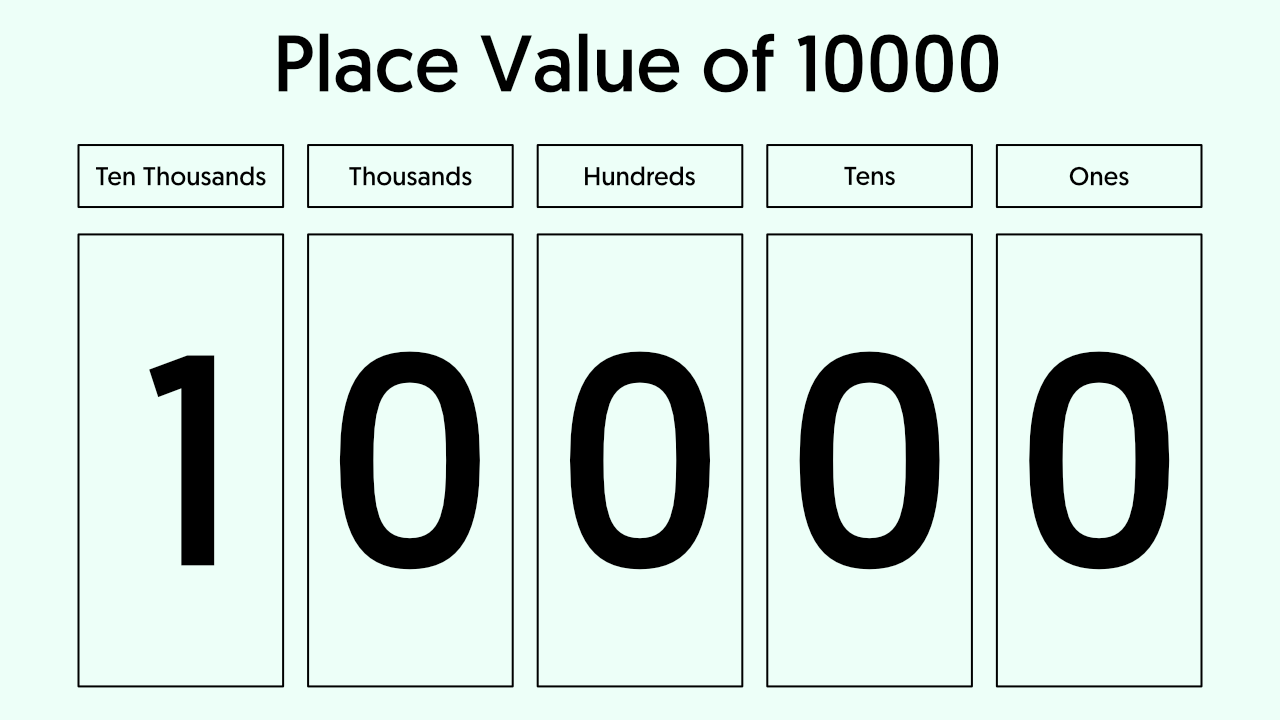How to Write 10000 in Words in English

In this article, we will learn how to write the number 10000 in words.
There are various situations where it is advisable and even necessary to know how to write a number in words. For instance, it is common practice, when writing in English, to write numbers in words. For larger numbers, like thousands, tens of thousands, hundreds of thousands and millions, it is also common practice to write them in words instead of their numeral form, in order to avoid the reader from misreading the number of zeros. Moreover, writing numbers in words becomes essential when filling out a cheque.
At The HDFC Schools, we pay great attention to ensuring that our students become street smart and astute as well as academically sound, by going beyond just the textbook. It is this attention to detail when it comes to the holistic development of children that has helped us rank among the best schools in Gurugram, top schools in Bengaluru and also among the 10 best schools in Pune.
How to Write 10000 in Words
10000 in words is Ten Thousand.
When talking about a sum of money, you'll add the currency name after the amount in words. For example, if you have ₹10,000 in your pocket, you'll say "I have ten thousand rupees in my pocket".
How to Write 10000 in English Words on a Cheque?
When filling out a cheque, it is necessary to write the numeral amount in words as well. This makes it more difficult to tamper with the cheque and therefore avoids any fraud. If there is any discrepancy between the numeral amount and the amount in words, the cheque will simply be rejected.
On a cheque, 10000 is written as "Ten Thousand Only." On most cheques, the word "Rupees" is already mentioned, so there is no need to actually write "Rupees" yourself. If there is a paise amount as well, e.g. ₹10,000.59, you can write it as "Ten Thousand and Fifty Nine Paise Only". It is also common to write "Ten Thousand and Paise Fifty Nine Only", to avoid any confusion that 59 is the paise amount. When writing the numerical value, ensure that you always end with a "/-" symbol to avoid tampering. For the same reason, when writing the amount in words, make sure to always end with the word "Only".
Place Value of 10000
Knowing the place value of a number helps you build a strong numerical foundation and enhances your arithmetic skills. Moreover, in this age of digital transactions, it's necessary to know your place values to avoid paying more or less money than you need to.
Below is the place value for 10000:
- The Digit in One's place = 0
- The Digit in Ten's place = 0
- The Digit in Hundered's place = 0
- The Digit in Thousand's place = 0
- The Digit in Ten Thousand's place = 1
Place Value Chart of 10000

More Facts About The Number 10000
Is 10000 a Prime Number?
No, 10000 is not a prime number. A prime number is only fully divisible by 1 and the number itself. 10000 is fully divisible by 25 numbers (which are known as its factors).
Is 10000 a Perfect Square?
Yes, 10000 is a perfect square of 100. This means that when you multiply 100 by itself, you get exactly 10000.
Is 10000 a Composite Number?
Yes, 10000 is a composite number. A composite number is the exact opposite of a prime number i.e. it is a number which has more than 2 factors. Any whole number that is not a prime number is a composite number.
Is 10000 an Even Number?
Yes, 10000 is an even number. Any number ending with 2, 4, 6, 8 or 0 is always an even number.
What is the square root of 10000?
The square root of 10000 is 100. The square root of a number is the number that, when it is multiplied by itself, returns the original number as the answer. 100 multiplied by 100 gives 10000.
Is 10000 a perfect cube?
No, 10000 is not a perfect cube. A perfect cube is a number that is the exact answer when multiplying a whole number by itself three times. 10000 is not the exact answer to any whole number multiplied by itself three times.
Is 10000 an Odd Number?
No, 10000 is not an odd number. Any number ending with 1, 3, 5, 7 or 9 is an odd number. You can also think of odd numbers as any numbers that are not even numbers (and vice versa). Odd numbers and even numbers are mutually exclusive, which means a number can be either odd or even, but not both.
What are the properties of 10000?
The basic properties of 10000 are as follows:
- The '1' digit in 10000 signifies a single set of ten thousand.
- The divisors of 10000 are 1, 2, 4, 5, 8, 10, 16, 20, 25, 40, 50, 80, 100, 125, 200, 250, 400, 500, 625, 1000, 1250, 2000, 2500, 5000, and of course, 10000. In all, 10000 has 25 divisors.
- The prime factorisation of 10000 is 2x2x2x2x5x5x5x5
How to Write Full 10000 Sequence in Words
10100 in words
We can express 10100 in words as Ten Thousand One Hundred or "Ten Thousand and One Hundred".
10200 in words
We can express 10200 in words as Ten Thousand Two Hundred or "Ten Thousand and Two Hundred"
10300 in words
We can express 10300 in words as Ten Thousand Three Hundred or "Ten Thousand and Three Hundred"
10400 in words
We can express 10400 in words as Ten Thousand Four Hundred or "Ten Thousand and Four Hundred"
10500 in words
We can express 10500 in words as Ten Thousand Five Hundred or "Ten Thousand and Five Hundred"
10600 in words
We can express 10600 in words as Ten Thousand Six Hundred or "Ten Thousand and Six Hundred"
10700 in words
We can express 10700 in words as Ten Thousand Seven Hundred or "Ten Thousand and Seven Hundred"
10800 in words
We can express 10800 in words as Ten Thousand Eight Hundred or "Ten Thousand and Eight Hundred"
10900 in words
We can express 10900 in words as Ten Thousand Nine Hundred or "Ten Thousand and Nine Hundred"
FAQs about 10000
How Many 1000s will make 10000?
Ten thousand's will be 10000, i.e. 10 × Thousand = 10 × 1000 = 10000 = Ten thousand.
Can 10000 be divided by prime numbers?
10000 is divisible by the prime numbers 2 and 5.
Related Articles
Did you find this article helpful and informative? We have other similar articles where you can learn how to write other round numbers (plus their entire sequence) in words.
